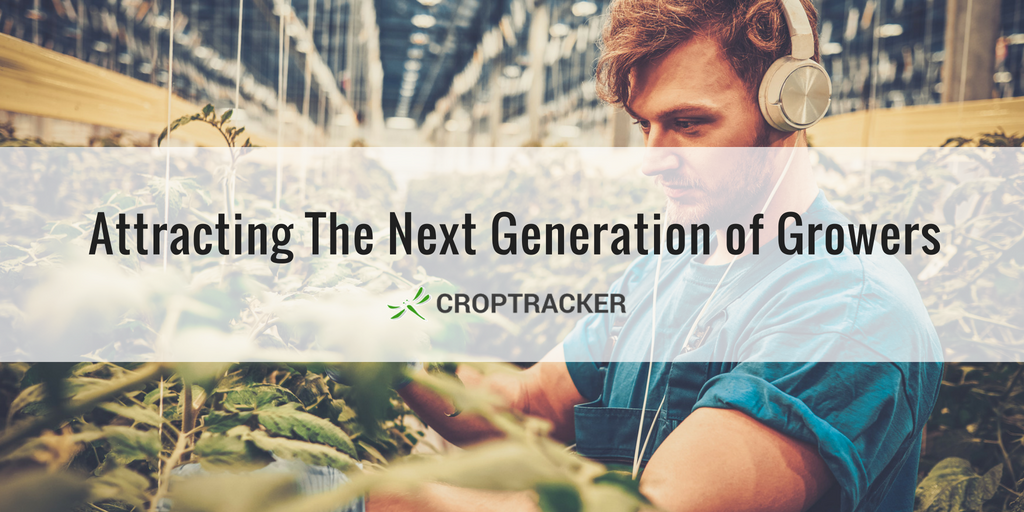Millennials yearn for careers with purpose. Farming, an incredibly rewarding calling, certainly fits the bill! But Millennials are also a generation with crushing debt anxiety, a need for social connection, and a fondness for instant gratification. Farming, on the other hand, is a career path of significant barriers to entry, social challenges, and delayed reward. As fewer and fewer young people enter the ag/hort sector, the question of how to attract the next generation of food producers becomes more and more pressing. In today’s blog post, we’ll examine the challenges facing young potential entrants, and add to the discussion of how to foster the next generation of growers.
Since 1991, the proportion of young growers in Canada has shrunk by more than 50%. In 1991, producers under 35 comprised 19.9% of the total population. In 2011, they made up 8.2% of the population. These downward trends are echoed around the world. What, exactly, is barring young people from farming? Here are a few possible deterrents:
Earning Potential Misconceptions
In an age when education costs are 213% what they were in 1988, it’s increasingly important to students that the career they pick promises a good return on their financial investment. But when the average student thinks of financially-lucrative career pathways, farming usually isn’t the first to leap to mind. Many would probably be surprised to learn that a grower can make as much as six figures 15 years into their career. Consequently, many students who could potentially discover a passion for agriculture may never look into the industry in the first place.
Furthermore, a 2017 San Diego State University study found that when it came to selecting their college majors, 71% of millennial post-secondary students said that making money was a more important consideration than pursuing their interests. It is a sad fact for a cohort who have been shown to prize finding purpose in their jobs that they feel they must settle for "safe" career pathways. It also suggests that even students who have a prior interest in the agricultural sector may be drawn into other fields that the public more typically associates with financial payoff.
High Financial Barriers to Entry
For those young would-be growers who are not inheriting farms and land, the financial obstacles to starting a farm are prohibitive. Case in point: the average cost of an acre of farmland is now in excess of $2,300.
Delayed Reward
Due to high start-up costs and lack of available land, most would-be growers without family roots in agriculture will need to start small and "'bootstrap' their way into larger operations", as said by this report on the future of farming. This delayed financial gratification may be to much of a hurdle for millennials, whose looming student debt creates the urge to earn lots - now.
Rural Isolation
Many prefer the solitude of the country over the bustle of the city, and the sounds of nature over the hum of traffic. For others, the thought of rural life can be daunting. Rural isolation can be a strong deterrent to those with an interest in farming but who grew up in urban settings. The long distances between a rural farm and stores, entertainment, friends, and family can create loneliness and exacerbate anxiety and depression. For many in the especially socially-inclined millennial generation, the prospect of the emotional adjustment to the farming lifestyle may prove too prohibitive.
Suggestions
So what can be done to mitigate these obstacles? Some organizations and governments are considering offering financial incentives and grants to help young growers shoulder the fiscal barriers. Here are some other ways in which the horticulture industry can attract and support the next generation of growers:
Address Earning Potential Misconceptions
One of the most important keys to attracting young potential growers who might otherwise be drawn to alternate industries, as discussed above, is simply busting the myth that food production isn't a lucrative career pathway. Not only will this help young people with a passion for agriculture feel confident enough to pursue it, it will also help those from diverse educational backgrounds discover the rewards a career in food production has to offer.
Mentors
Studies involving young growers note that mentorship is an extremely important key to success. Many organizations are developing programs (like The Atlantic Canadian Organic Regional Network's Grow a Farmer program) that let students and young entrants tap into the wisdom of established growers, with overwhelmingly positive reactions from both mentees and mentors. From online chat sessions to on-farm apprenticeships, mentorship opportunities appear to be one of the best ways to help new entrants develop the skills, knowledge, and confidence to pursue and succeed in a farming career.
Online Opportunities For Sharing & Collaboration
In-person social groups for young entrants may be impossible in deeply rural areas, where their peers are few and far between. However, socializing online with fellow young growers can help alleviate the sense of rural isolation and relieve the consequent symptoms of stress and depression. The collaboration and support can also help new farms suceed and spur innovation. Social communities can also inspire and embolden newcomers - by chatting with and viewing snippets of their lives, potential growers get a much better idea of the real day-to-day and rewards of farming. Social media presences for under-represented farmer demographics are especially important: take for example #WomenofHarvest. This viral hashtag on Twitter helped female farmers receive recognition and bond over their shared challenges and successes. It also undoubtedly inspired other female would-be growers, who may have otherwise felt intimidated to enter this traditionally male-dominated field.
Access to Technology
Most Millennials are constantly surrounded by technology, and they expect nothing less during their work hours. Studies of millennial attitiudes toward technology in the workplace have shown that efficiency is highly prized, and sufficient technology is expected. In the farming sector, this suggests a need to invest in tools that drive efficiency - like mechanized pickers, RFID technology in packhouses, and crop management software. Indeed, "there is an expectation among young farmers that they will be able to do paperwork, do reporting, and fill out applications online," says Lindsey Lusher Shute of the United States's National Young Farmers Coalition.
Thank you for reading this week's blog post! Do you have any suggestions on how to safeguard the future of farming and attract the next generation of growers? Feel free to share your thoughts on our Facebook and Twitter pages!
| Missed Last Week's Blog Post? Tackling The $31B Food Loss Problem |


